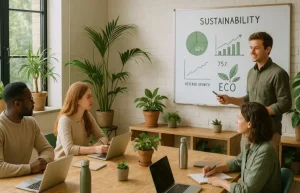Table of Contents
ToggleStarting a new business is an exciting, fast-paced journey full of ambition, opportunity, and innovation. But with that momentum comes a responsibility, especially in today’s climate-conscious world. Startups in the UK are not just expected to succeed financially; they are also being called upon to play their part in preserving the environment.
Balancing economic growth with environmental responsibility might seem overwhelming for emerging ventures. However, this balance is no longer optional, it is a necessity.
Customers, investors, and regulators are all placing increasing pressure on businesses to operate sustainably, and startups, with their flexibility and innovation, are in the perfect position to lead the way.
This article explores the most effective ways UK startups can align their growth ambitions with a genuine commitment to environmental sustainability.
What Role Does Environmental Sustainability Play in the Success of Startups?

Environmental sustainability has evolved from a buzzword into a business necessity. In the UK, legislation such as the Net Zero Strategy and increasing consumer demand for green practices have made environmental considerations crucial for any startup aiming for longevity.
Startups that embrace sustainability from the outset enjoy several benefits. First, they build trust with eco-conscious consumers who are more likely to support brands that reflect their values.
Second, sustainable startups are more attractive to investors focusing on ESG (Environmental, Social and Governance) principles. Third, operating sustainably often leads to long-term cost savings through energy efficiency, waste reduction, and streamlined supply chains.
Additionally, environmentally responsible startups help shape a positive brand identity, giving them an edge in crowded markets. A purpose-driven business not only appeals to customers but also helps attract top talent who want to work for companies making a difference.
What Common Challenges Prevent Startups from Going Green?
Despite the advantages, startups often encounter several hurdles when trying to implement environmentally friendly practices. One of the most significant barriers is financial.
Many sustainable solutions require upfront investments, whether in eco-friendly packaging, renewable energy systems, or ethical supply chain practices. For startups operating on limited budgets, these investments can feel out of reach.
There is also the issue of time and knowledge. Many startup founders are heavily focused on building their product or service and may lack the expertise to implement effective green strategies. Furthermore, the pressure to scale quickly often leads to prioritising short-term wins over long-term sustainability.
However, addressing these challenges doesn’t mean startups must overhaul their entire operation overnight. It’s more realistic and achievable to take small, strategic steps that collectively lead to impactful change over time.
How Can Startups Grow Sustainably Without Compromising Profitability?
Sustainable startup growth doesn’t mean sacrificing profits. In fact, environmentally responsible business practices can fuel growth by enhancing brand credibility and operational efficiency. The key lies in making sustainability part of the business strategy, not an afterthought.
A powerful way to do this is by adopting a green business model from the outset. Startups that embed sustainability into their core operations, whether in product design, logistics, or waste management, find it easier to maintain eco-consciousness as they scale.
For example, product-based startups can opt for materials that are recyclable or biodegradable, reducing both their carbon footprint and end-of-life waste.
Reducing energy consumption is another critical area. Using energy-efficient systems, optimising office space, and embracing remote working where possible can lower operational costs and environmental impact.
In London, startups often struggle with effective waste disposal as they expand. Partnering with a reliable waste management service like www.rubbishremoval.uk, a professional rubbish removal company, ensures responsible handling of office and production waste, helping startups reduce landfill contribution and maintain environmental compliance.
What Innovative Practices Are Startups Using to Be Environmentally Responsible?

Many of the UK’s most innovative startups are building their success around green technologies and eco-conscious services. Innovation isn’t just about flashy apps or new gadgets, it also means rethinking how businesses interact with the environment.
Green tech startups, for instance, are developing clean energy alternatives, carbon capture solutions, and low-impact manufacturing techniques. Meanwhile, digital startups are reducing their environmental footprint simply by operating online and minimising physical products.
A strong example of innovation in sustainability is the adoption of circular economy principles. Instead of creating goods with a linear ‘make, use, dispose’ approach, circular models encourage reuse, repair, and recycling. This reduces waste and conserves resources.
Startups can also use digital tools to track their sustainability goals, such as software that calculates their carbon footprint or assesses supply chain ethics. These technologies allow small businesses to make data-driven decisions that benefit both their bottom line and the environment.
Which UK Startups Are Leading the Way in Environmental Responsibility?
Several UK-based startups are proving that it is entirely possible to scale a business while keeping sustainability at the forefront.
Olio, a food-sharing platform, has created a network that prevents food waste by connecting individuals and businesses with surplus food to those who need it. Their model not only addresses hunger and food waste but also contributes to carbon reduction.
Notpla, another standout, produces biodegradable packaging made from seaweed. Their products are a direct response to plastic pollution and demonstrate how innovative materials can disrupt traditional manufacturing practices.
These startups are not just thriving because of their products, they are thriving because of their principles. Their environmental missions have become core to their brand identity, helping them attract loyal customers, committed employees, and impact-focused investors.
What Are Investors Looking for in Environmentally Responsible Startups?
Investors are becoming increasingly selective when it comes to backing startups. Beyond revenue potential, they want to see commitment to sustainability, governance, and social responsibility.
Startups that take environmental responsibility seriously are often viewed as lower-risk investments because they are more adaptable to future regulatory changes and shifting consumer behaviour. They’re also more likely to establish long-term stability, especially in a world where climate change and environmental degradation are top-of-mind issues.
In the UK, ESG investing is growing rapidly. Investors are actively seeking businesses that show a clear ESG strategy, and startups that can demonstrate how they align with these values stand a better chance of securing funding.
What Support Does the UK Government Offer Green Startups?
The UK government has taken significant steps to promote environmental sustainability across all sectors, including startups. Through grants, tax relief, and regulatory guidance, startups are encouraged to invest in clean growth strategies.
Initiatives such as Innovate UK offer funding to businesses working on clean technologies and energy-efficient solutions. The Clean Growth Fund supports early-stage companies aiming to reduce carbon emissions through scalable innovations.
Moreover, the government’s Net Zero Strategy and Green Finance Roadmap provide policy support and financial incentives to help startups adopt greener practices without suffering financially in the early stages of development.
Regulatory frameworks are also evolving to accommodate sustainable businesses, offering clarity and consistency to those committed to environmental responsibility.
What Practical Actions Can Startups Take Immediately?
While long-term sustainability requires strategic planning, there are simple, actionable steps that startups can implement today.
Setting measurable sustainability goals is a great starting point. This might involve reducing energy usage by a certain percentage over six months, sourcing materials locally, or committing to a zero-landfill policy.
Startups should also measure and track their environmental performance. Tools like the Carbon Trust’s footprint calculator or lifecycle assessment software help identify high-impact areas and opportunities for improvement.
Communication plays a crucial role. By involving customers, employees, and stakeholders in sustainability goals, whether through educational content or eco-conscious product features, startups can build strong relationships and reinforce their environmental mission.
Practical Sustainability Actions for UK Startups
| Sustainability Area | Immediate Action | Long-Term Impact |
| Office Energy Use | Switch to LED lighting and smart meters | Lower energy bills and carbon emissions |
| Product Development | Use recyclable or biodegradable materials | Reduced landfill waste and improved branding |
| Waste Management | Partner with eco-friendly disposal firms | Compliance with regulations and better PR |
| Supply Chain | Source from local ethical suppliers | Reduced transport emissions and better quality |
| Transportation | Promote remote work or cycle schemes | Fewer emissions and improved employee health |
How Can Startups Build a Future-Focused and Responsible Business?
Balancing startup growth with environmental responsibility is not only possible, it’s increasingly necessary in the modern business landscape. For UK startups, especially, sustainability is no longer a “nice to have”; it’s a defining aspect of long-term success.
By taking conscious, consistent actions, from embedding green principles into their business model to using data to track their impact, startups can create real change. They can meet the demands of today’s ethical consumers and proactive investors while contributing to the broader goal of environmental preservation.
Startups that embrace this dual responsibility will not only be more resilient to market changes, but will also stand as leaders in building a future that’s profitable, ethical, and green.
Frequently Asked Questions
How early should a startup implement sustainability policies?
Ideally from the beginning. Early adoption ensures sustainability is integrated into the business’s DNA rather than bolted on later.
Do sustainable practices cost more for startups?
Not necessarily. While some green solutions require initial investment, they often lead to cost savings in the long run through efficiency and waste reduction.
What is the benefit of aligning with ESG principles?
Startups aligned with ESG attract better investment opportunities, retain customers longer, and build stronger internal cultures.
Are there free tools to track a startup’s environmental impact?
Yes. The Carbon Trust, WWF footprint calculator, and various carbon accounting tools offer free resources to get started.
Can service-based startups be environmentally responsible?
Absolutely. Reducing digital energy use, offering remote services, and partnering with green vendors are all effective strategies.
Is sustainability relevant in all industries?
Yes. Regardless of sector, all businesses impact the environment and can take steps to minimise their footprint.




